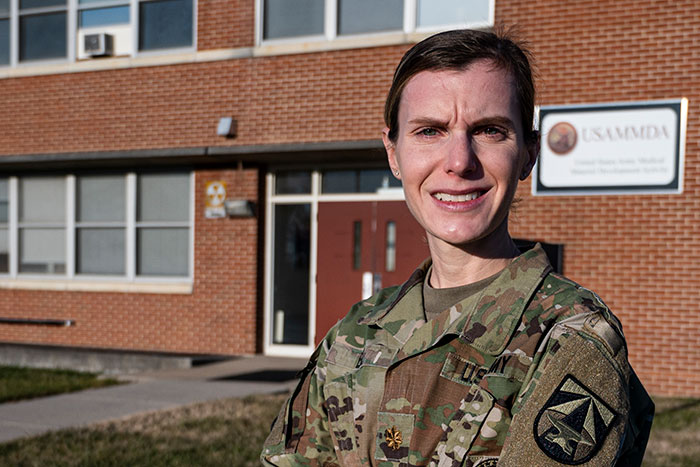USAMMDA internship program builds next generation of AMEDD acquisition corps

Program Management Acquisition Interns with the U.S. Army Medical Materiel Development Activity visited the U.S. Army's Program Executive Office for Simulation, Training and Instrumentation recently to broaden their understanding of the role of Army acquisitions.
The USAMMDA interns and staff members travelled to PEO STRI's home base at Naval Support Activity Orlando, Florida as part of a collaborative effort between the two commands. USAMMDA's Program Management Acquisition Internship Program (PMAIP) interns are all Medical Service Corps officers seeking designation as Army Medical Department Acquisition Officers, or 8X.
"PMAIP is designed to take Medical Service Corps officers and expand their acquisition knowledge base through a combination of didactic and experiential training," said U.S. Army Maj. Joseph Remesz- Guerrette, an assistant program manager with USAMMDA's Warfighter Deployed Medical Systems Project Management Office at Fort Detrick, Maryland. "The program produces officers ready to assume program manager roles throughout the Army and Department of Defense. The PMAIP is significant to USAMMDA because it generates future 8X program managers, many of whom serve at USAMMDA and across program management positions within the Army today."
During the visit to Orlando, the PMAIP interns met with PEO STRI and Defense Health Agency leadership to learn more about the mutually beneficial relationships between USAMMDA, PEO STRI and the wider U.S. Army Medical Corps field.
"The purpose of the trip is to expose our interns to the PEO STRI team and gain a better understanding of their operations and projects, specifically within the medical PMOs," said Remesz-Guerrette, who has served as an Army nuclear pharmacist for 10 years. "This allows our interns to develop relationships across the enterprise that will carry on, benefitting the USAMMDA team and Army program management as a whole."
USAMMDA is composed of five Project Management Offices staffed by several hundred U.S. Army Soldiers, Army civilians and contractors. The individual PMOs are staffed by project managers and support staff to move medical technologies, treatments, and equipment from novel concept, through development and testing, and eventually U.S. FDA approval before finally reaching the hands of Warfighters in the U.S. Joint Force. A key component in the process is the Army Medical Department Acquisition Officers who connect the DOD's medical development enterprise with the medical provider end users in the Army, Navy, Air Force and Marines.
A primary building block for the DOD's wider acquisition program is PMAIP, which is designed to help train innovative and experienced 8X officers to manage the complex mechanisms of fielding new and improved medical capabilities to the Joint Force, according to Maj. Dana Bal, a USAMMDA assistant program manager and member of the current PMAIP.
"The PMAIP program is important because it serves as pathway to produce trained and competent Army Medical Department acquisition program managers," said Bal, who has served as an Army pharmacist since 2010 after commissioning through the ROTC program at the University of Pittsburgh. "The PMAIP allows interns one-year to primarily focus on the training required to become a competent program manager. This is an overall win for USAMMDA and the AMEDD because the medical acquisition 'bench' is continuously built through this program."
The typical PMAIP intern is a seasoned and experienced U.S. Army medical officer with years of experience in operational medical units, managing Soldiers, providing patient care, and training for America's next fight. For Bal, who deployed to Baghdad in 2011 as part of the Iraq War, the PMAIP offers a chance to not only learn about the vital role 8X officers play in AMEDD, but also the skills to "create and maintain collaborative and functional multidisciplinary teams that work together to solve problems and advance materiel programs," she said.
"Although communication, both verbal and written, is probably the most important 'soft skill' that is required to be a successful program/project manager, other necessary skills include conflict management, team development, negotiation, networking, and active listening," said Bal. "The effort I put forth in improving these skills will only make me a better Army leader and pharmacist."













